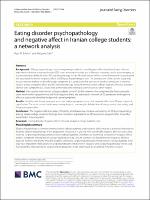Please use this identifier to cite or link to this item:
https://hdl.handle.net/20.500.12202/9745| Title: | Eating disorder psychopathology and negative affect in Iranian college students: A network analysis |
| Authors: | Sahlan, Reza N. Sala, Margaret 0000-0002-1560-649x |
| Keywords: | Eating disorder Negative affect Network analysis College students Iran |
| Issue Date: | 2022 |
| Publisher: | BioMed Central |
| Citation: | Sahlan, R., & Sala, M. (2022). Eating disorder psychopathology and negative affect in Iranian college students: A network analysis. Journal of Eating Disorders, 10(1), 1-14. |
| Series/Report no.: | Journal of Eating Disorders;10(1) |
| Abstract: | __Background: ED psychopathology is becoming more prevalent in Iran. Negative affect has been found to be an important risk factor in eating disorder (ED) onset in research conducted in Western countries, and is also emerging as a potential vulnerability factor to ED psychopathology in Iran. Network theory offers a novel framework to understand the association between negative affect and ED psychopathology in Iran. The primary aim of the current study was to use network analysis to identify bridge symptoms (i.e., symptoms that activate or weaken symptoms in another cluster) across a negative affect and ED psychopathology network among Iranian college students. We also aimed to identify core symptoms (i.e., nodes that demonstrate the strongest connections to other nodes). Method: Participants were Iranian college students (n = 637; 60.3% women) who completed the Farsi-eating disorder examination-questionnaire and Farsi-negative affect. We estimated a network of ED symptoms and negative affective states and identified bridge and central symptoms. __Results: Hostility and shame emerged as central bridge symptoms across the negative affect and ED psychopathology clusters. The most central nodes were strong desire to lose weight, definite fear of losing control over eating, and binge eating episodes. Conclusion: The negative affective states of hostility and shame may increase vulnerability to ED psychopathology among Iranian college students. Findings have important implications for ED prevention programs that should be examined in future research. __Plain English summary: ED psychopathology is common among Iranian college students, and negative affect may be a potential vulnerability factor to ED psychopathology in this population. However, it is unclear how specifically negative affective states may relate to ED psychopathology among Iranian college students. Therefore, we examined a network of negative affect and ED symptoms among Iranian college students (n = 637; 60.3% women). We found that the negative affective states of hostility and shame may link negative affect and ED psychopathology among Iranian college students. Findings have important implications for understanding the link between negative and ED psychopathology in Iran, and have potential implications for ED prevention programs in Iran that should be examined in further research. |
| Description: | Original Paper / Open access |
| URI: | https://search.ebscohost.com/login.aspx?direct=true&AuthType=ip,sso&db=edssjs&AN=edssjs.F2C23439&site=eds-live&scope=site https://hdl.handle.net/20.500.12202/9745 |
| ISSN: | 2050-2974 |
| Appears in Collections: | Ferkauf Graduate School of Psychology: Faculty Publications |
Files in This Item:
| File | Description | Size | Format | |
|---|---|---|---|---|
| Sal Sahlan ED Pschopathology 10.1 OA.pdf | 1.88 MB | Adobe PDF |  View/Open |
This item is licensed under a Creative Commons License

